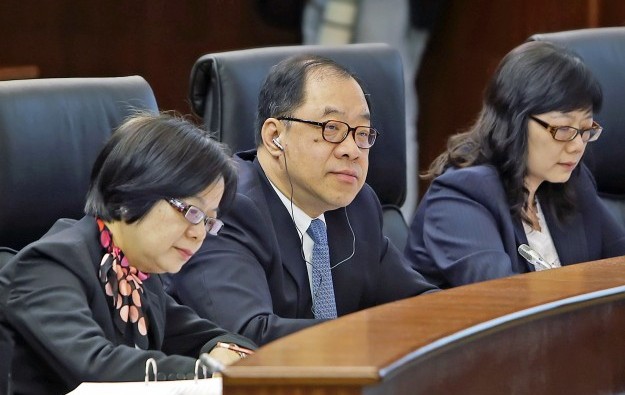Gaming policy chief likely to postpone retirement
May 14, 2014 Newsdesk Features, Latest News, Macau, Top of the deck

Francis Tam (pictured, centre), the Macau government official in charge of gaming industry policy, has agreed to stay on past retirement age. That’s if asked by Beijing, according to separate sources spoken to by GGRAsia.
The Secretary for Economy and Finance, aged 65, had been expected to step down in December at the end of Chief Executive Fernando Chui Sai On’s first term.
The sources suggest it’s almost certain that Beijing will ask Mr Tam to carry on into Mr Chui’s virtually guaranteed second term, as there is no settled candidate to succeed Mr Tam at this stage. It’s not clear however whether he might seek to retire part way through Mr Chui’s second five-year term – and possibly before the casino concession renewal issue is decided.
Mr Tam has been in charge of the economy since the handover from Portuguese administration in 1999. One important aspect of his role is that he has personal knowledge of all the comfort letters given to casino investors over the years. Such letters – usually issued only by a very senior government official such as the chief executive or Mr Tam himself – are thought to cover issues including table allocation for specific casino projects and in other cases who has the right to so-called service agreements – casino projects spinning off from an existing concessionaire’s licence.
There are rumours that several comfort letters exist in relation to table allocation on some Cotai casino projects. But such letters are not usually made public – even by market-listed companies. Macau Legend Development Ltd did however make reference to one last year in its global share offering prospectus in relation to table allocation it said it had been promised for expansion, claiming the allocation was outside the Macau government’s table cap, which is set at three percent annual compound growth until 2022.
Macau’s first chief executive Edmund Ho Hau Wah took a direct interest in the development of Macau’s gaming industry policy. Industry insiders say his successor Mr Chui appears to have devolved much of that responsibility to Mr Tam.
As a result, the Secretary for Economy and Finance job has become nearly as politicised as the chief executive role. Some robust and possibly creative thinking is likely to be needed by whoever holds the job in future, in order to solve some of the policy puzzles – including the table cap, the labour shortages and the casino concession renewal issue which will arise in Mr Chui’s second term.
Possible replacements for Mr Tam touted in government circles are: Anselmo Teng Lin Seng, chairman of the Monetary Authority of Macau; Lau Pun Lap, an economist; Vitória Alice Maria da Conceição, director of the Financial Services Bureau, and Lionel Leong Vai Tac, a well-known businessman and member of the Macao Chamber of Commerce.
Mr Teng already has an international profile. He’s been Macau’s central banker since the handover in 1999. He also oversaw the implementation – from 2006 onward – of Macau’s anti-money laundering policy which was designed to put the territory in compliance with international standards. But the US$62,500 reporting thresholds for casino transactions in Macau were criticised in November by a U.S. Congressional report.
Mr Lau heads a Macau government think-tank established in 2011 to carry out research on political, economic, legal and social issues. He’s also a former legislator, so has good political contacts locally.
Were the government to skip the immediate post handover generation of officials, it might consider Ms Conceição. She graduated in business administration from the University of Macau in 1992. She joined the finance bureau in 1993 as a senior technician.
Mr Leong has previously been pinpointed as a potential front-runner to succeed Mr Chui as chief executive. He is currently a member of the Executive Council, the Macau government’s advisory body, and of the National People’s Congress.
One advantage of Mr Tam staying on is that it avoids the risk of him becoming a ‘lame duck’ in relation to the concession renewals. The term was originally coined in the 18th century to refer to investors unable to pay debts but has since crossed over into political circles. It indicates that the nearer an official gets to retirement or relinquishing office, the harder it is to convince interested parties to have talks or make deals with that person.
Related articles
-
 Macau 2024 GDP to rise 10pct y-o-y: Lei...
Macau 2024 GDP to rise 10pct y-o-y: Lei...Feb 27, 2024
-
 Macau 2023 visitor tally likely 28mln:...
Macau 2023 visitor tally likely 28mln:...Dec 11, 2023
More news
-
 Donaco EBITDA up y-o-y to above US$4mln...
Donaco EBITDA up y-o-y to above US$4mln...Jul 26, 2024
-
 HK listed Palasino upgrades Czech...
HK listed Palasino upgrades Czech...Jul 26, 2024
Latest News
Jul 26, 2024
Border-casino operator Donaco International Ltd has achieved a 164.17-percent year-on-year increase in its latest quarterly group earnings before interest, taxation, depreciation and amortisation...Sign up to our FREE Newsletter
 (Click here for more)
(Click here for more)
Pick of the Day
”We’ve got more traction outside of Macau at the moment. But Macau’s going be a bigger focus for us”
David Punter
Regional representative at Konami Australia
Most Popular
 Sheraton brand to exit Londoner Macao, to be Londoner Grand July 25, 2024
Sheraton brand to exit Londoner Macao, to be Londoner Grand July 25, 2024  Macau regulator probes unlicensed gaming agents July 24, 2024
Macau regulator probes unlicensed gaming agents July 24, 2024  Philippines gives 20k aliens in POGOs 60 days to leave July 25, 2024
Philippines gives 20k aliens in POGOs 60 days to leave July 25, 2024  Philippines-listed DigiPlus says not affected by POGO ban July 24, 2024
Philippines-listed DigiPlus says not affected by POGO ban July 24, 2024  Sands China 2Q EBITDA down q-o-q amid low hold, renovation July 25, 2024
Sands China 2Q EBITDA down q-o-q amid low hold, renovation July 25, 2024






